How_can_we_become_good_learners重点短语知识点讲解 (1)
Unit-1How-can-we-become-good-learners知识点归纳

Unit 1 How can we become good learners单元短语1.work with sb及某人一起学习2.make word cards制作单词卡片3.listen to tapes听录音磁带4.ask sb for help向某人求助5.watch videos看录像6.have conversations with sb同某人谈话7.too...to..太...而不能...8.give a report作报告9.at first起初10.word by word逐词逐句地11.the secret to.... ...的秘诀12.be afraid to do sth胆怯做某事 1 3.fall in love with爱上... 14.body language肢体语言15.as well也16.a piece of cake小菜一碟;很简单的事17.look up查阅;查找 . 18.so that以便;为了19.repeat out loud大声跟读20.take notes记笔记21.sentence patterns句型22.spoken English英语口语23.make mistakes in在...方面犯错24.the ability to do sth做某事的实力25.depend on视...而定;取决于;依靠26.pay attention to留意;关注27.connect...with... 把...和...连接或联系起来28.get bored感到厌烦29.try to do sth尽力做某事30.be stressed out焦虑不安的31.be afraid of胆怯... 32.each time每当;每次语法知识:提问方式How do you...?或How can I...答语: by+doing形式,“通过做...”的方式Eg: How do you study for a test How can I turn on the lightI study by working with a group. By turning this button.拓展:介词by的其他用法:1)by+交通工具,“乘/坐...” by bus2)by+地点,“在...的旁边;靠近...” by the lake3)by+时间,= before“截止到...;不迟于...” by ten4)辨析by, with, in,“用”“用”某种手段, 交通工具, 传递方式或媒介等侧重“用”有形工具, 材料, 内容等“用”语言, 语调, 笔墨, 颜色等知识点讲解:section A1.by asking the teacher for help通过向老师求助。
How_can_we_become_good_learners重点短语知识点讲解
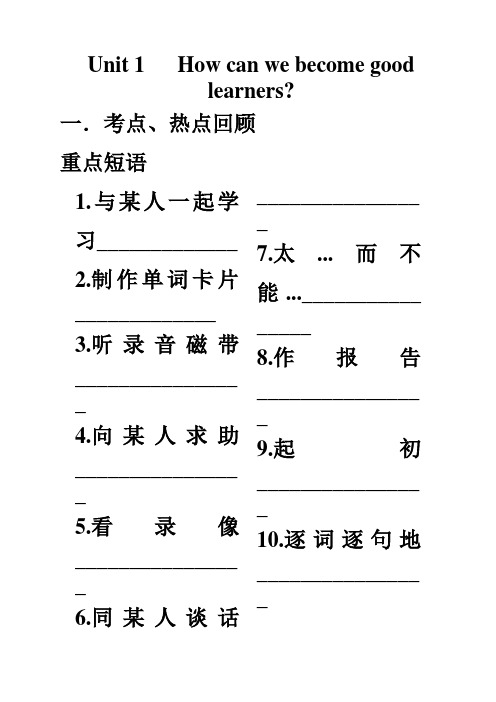
Unit 1 How can we become goodlearners?一.考点、热点回顾重点短语1.与某人一起学习_____________2.制作单词卡片_____________3.听录音磁带_______________ _4.向某人求助_______________ _5.看录像_______________ _6.同某人谈话_______________ _7.太...而不能...___________ _____8.作报告_______________ _9.起初_______________ _10.逐词逐句地_______________ _11....的秘诀_______________ _12.害怕做某事_______________ _17.爱上...___________ _____18.肢体语言_______________ _19.也_______________ _20.小菜一碟;很容易的事_______________ 21.查阅;查找_______________ _22.以便;为了_______________ _23.大声跟读_______________ _24.记笔记_______________ _25.句型_______________ _26.英语口语_______________ _27.在...方面犯错_______________ _28.做某事的能力_______________ _13.取决于;依靠_______________ _14.注意;关注_______________ _15.感到厌烦_______________ _29.尽力做某事________________30.焦虑不安的_______________ _31.害怕...___________ _____16.每当;每次_______________ 32.把.和...连接起来_______________ _重点句型:1.“越...越...”的表达法: The more you read, the faster you’ll be.2.so...that..引导结果状语从句:The teacher spoke so quickly that I did not understand her most of the time.3.so that引导目的状语从句:I want to learn new words so that I can have a better understand of English movies.4.谈论做事方式:(1)—How do you learn English? —I learn by studying with a group.(2)—Do you learn English by reading aloud?Yes, I do. It helps my pronunciation.5.whether引导主语从句:But whether or not you can do this well depends on your learning habits.知识点讲解:一.--------How do you learn English? —I learn by studying with a group.1.“by+doing形式”表示方式、方法语法结构by+doing形式,“通过做...的方式”I learnChinese bylistening totapes。
Unit 1 How can we become good learners知识点整理

Unit 1 How can we become good learners?语法一.介词by的用法1.by意为“通过”,其后常接名词或动词-ing形式。
用来表示“以、通过、用(某种方法或手段)”而达到某种预期的目的,常用来回答how引导的特殊疑问句。
by doing sth意为“通过做某事”—How does the boy improve his spoken English?—By talking with a foreigner.(1)—How do you learn English so well?—chatting with my uncle in America online.A. ByB. WithC. InD.And(2)Jackson studied Chinese by __________ tapes.A. listeningB. to listenC. listening toD. to listening to2.by+时间,意为“不迟于,在……之前”I have to go to bed by ten o’clock.3.by+地点,意为“在……旁”Jim sat down by the window.4.by+交通工具,意为“乘……”I go to school by bike.5.由by构成的固定短语:by the way顺便说一下by oneself独自=alone二.现在完成时的用法(一)用法:1.表示过去发生的某一动作或状态对现在造成的影响或结果.常用的标志词有already(“已经”,用于肯定句),yet(“还,已经”,用于否定句和疑问句),ever (“曾经”),never(“绝不,从不”),just(“刚刚”),before(“以前”),once (“一次”),twice(“两次”).I have already eaten the dinner.(说明我现在饱了)。
Unit 1 How can we become good learners.重点词汇
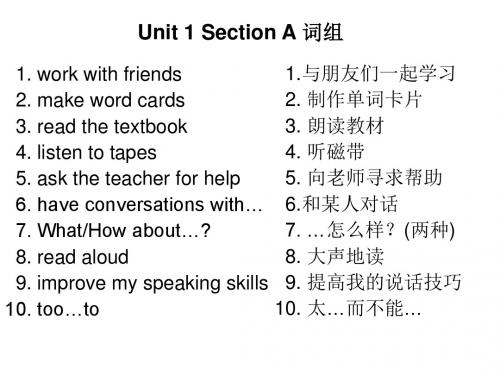
31. 也 32. 用字典查单词 33. 有趣的事 34. 做语法练习 35. 记笔记 36. 大声地重复 37. 练习做某事 38. 擅长…
Unit 1 Section B 词组
1.make mistakes 1. 犯错 2.In common 2. 共同点 3.get bored 3. 变得无聊 4.find out 4. 找出;发现 5.learn from 5. 从…中吸取 6.be born with 6. 天生具有 7.pay attention to 7.注意(短语) 8.connect…with 8.把…和…连接或联系起来 9.depend on 9. 取决于 10.learning habits 10. 学习习惯
任务型阅读
How I Learned to Learn English
Last year, I did not like my English class. Every class was like a bad dream. The teacher spoke so quickly that I did not understand her most of the time. I was afraid to ask questions(A) my poor pronunciation. I just hid behind my textbook and never said anything. Then one day I watched an English movie called Toy Story. I fell in love with this exciting and funny movie ! So I began to watch other English movies, too. Although I could not understand everything the characters said, their body language and the expressions on their faces helped me to get the meaning. I also realized I could get the meaning by listening for just the key words. My pronunciation improved as well by listening to the conversations in English movies. I discovered that listening to something interesting is the secret to language learning. I also learned useful sentences like “It’s a piece of cake” or “It serves you right”. I did not understand these sentences at first. But because I wanted to understand the story, I (B) in a dictionary. Now I really enjoy my English class. I want to learn new words and more grammar so that I can have a better understanding of English movies
人教版九年级英语Unit-1How-can-we-become-good-learners重点解析.

注意:该句式中的have或has是助动
词,has用于第三人称单数,其它人称
一律用have。
2. 否定句:现在完成时的否定句式是 “haven’t(hasn’t)+过去分词”。 3. 疑问句:现在完成时的一般疑问句式 是把助动词have或has提到主语之前。 回答用Yes, …have (has). /No, …haven’t (hasn’t). 连用时间状语:already, yet, ever, never, just, before, several times 等。
2) by+ 交通工具、交通方式名词 travel by air /land/sea. go by train /boat/ bus 3) by+ 地点名词。表方位,“在……旁边” by the lake/river/window/door
4) by+时间名词。“到……时(已发生某事); 最晚、不迟于……;在……之前”,此时谓语多 用完成时。 By now/ then/ this time/ next Friday/ the end of last year/ three o’clock
3)(指方式、方法)怎样,怎么 How did you solve this question? 你是如何解决这个问题的? How do you get to school? 你是如何去学校的? 4) 用于惊叹句中,表示多么、何等。 How well you look! 你看起来多么健康啊! How I wish to have a long vacation these days! 这些天我多么希望去度一次长假啊!
3、另外, by作为介词的意义有很多, 例如: 1)逐批 one by one 一个接一个 2)沿着,经由 come by the highway 由公路来 3)由于 by mistake 由于差错 4)被,由 some articles written by Lu Xun 一些由鲁迅写的文章 5)表示面积 a room 5m by 4m 一间长五米宽四米的房间 4、固定短语
Unit 1 How can we become good learners- 短语归纳
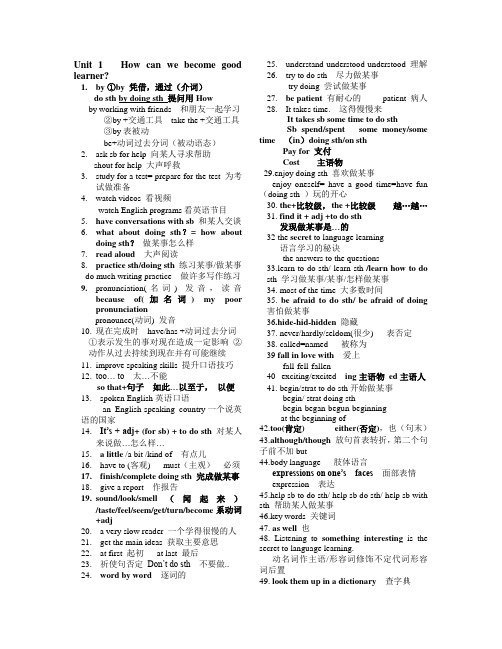
Unit 1 How can we become good learner?1.by ①by 凭借,通过(介词)do sth by doing sth 提问用Howby working with friends 和朋友一起学习②by +交通工具take the +交通工具③by表被动be+动词过去分词(被动语态)2.ask sb for help 向某人寻求帮助shout for help 大声呼救3.study for a test= prepare for the test 为考试做准备4.watch videos 看视频watch English programs看英语节目5.have conversations with sb和某人交谈6.what about doing sth?= how aboutdoing sth?做某事怎么样7.read aloud大声阅读8.practice sth/doing sth练习某事/做某事do much writing practice 做许多写作练习9.pronunciation(名词) 发音,读音because of(加名词) my poorpronunciationpronounce(动词) 发音10.现在完成时have/has +动词过去分词①表示发生的事对现在造成一定影响②动作从过去持续到现在并有可能继续11.improve speaking skills 提升口语技巧12.too… to 太…不能so that+句子如此…以至于,以便13.spoken English英语口语an English-speaking country一个说英语的国家14.It’s + adj+ (for sb) + to do sth 对某人来说做…怎么样…15. a little /a bit /kind of 有点儿16.have to (客观) must(主观)必须17.finish/complete doing sth 完成做某事18.give a report 作报告19.sound/look/smell(闻起来)/taste/feel/seem/get/turn/become系动词+adj20. a very slow reader 一个学得很慢的人21.get the main ideas 获取主要意思22.at first 起初at last 最后23.祈使句否定Don’t do sth不要做..24.word by word 逐词的25.understand-understood-understood 理解26.try to do sth 尽力做某事try doing 尝试做某事27.be patient 有耐心的patient 病人28.It takes time. 这得慢慢来It takes sb some time to do sthSb spend/spent some money/some time (in)doing sth/on sthPay for 支付Cost 主语物29.enjoy doing sth 喜欢做某事enjoy oneself= have a good time=have fun (doing sth )玩的开心30. the+比较级,the +比较级越…越…31. find it + adj +to do sth发现做某事是…的32 the secret to language learning语言学习的秘诀the answers to the questions33.learn to do sth/ learn sth /learn how to do sth 学习做某事/某事/怎样做某事34. most of the time 大多数时间35. be afraid to do sth/ be afraid of doing 害怕做某事36.hide-hid-hidden隐藏37. never/hardly/seldom(很少) 表否定38. called=named 被称为39 fall in love with 爱上fall-fell-fallen40exciting/excited ing主语物ed主语人41. begin/strat to do sth开始做某事begin/ strat doing sthbegin-began-begun-beginningat the beginning of42.too(肯定) either(否定),也(句末)43.although/though放句首表转折,第二个句子前不加but44.body language 肢体语言expressions on one’s faces面部表情expression 表达45.help sb to do sth/ help sb do sth/ help sb with sth 帮助某人做某事46.key words 关键词47. as well也48. Listening to something interesting is the secret to language learning.动名词作主语/形容词修饰不定代词形容词后置49. look them up in a dictionary 查字典50. have a better understanding of有更深理解51. study-studied-studied-studies-studying52.take notes /write down the notes 记笔记53. do exercises 做练习read a lot 大量阅读54.work out/ solve the problem 解决问题55.memorize sentence patterns记句型memory(名词)56.how often问频率How long针对for+一段时间How far距离,路程How soon多久,针对in+时间57. keep a diary 记日记58. use an English dictionary 用字典be used to doing sth 习惯做某事used to do sth 过去,曾经做某事59. how to do sth怎样做某事what to do做什么60. increase the reading speed增加阅读速度61. make mistakes (in…)在某方面犯错62. easy enough/enough money63.challenge 挑战solution解决方案64. get… right使正确的65.join an English club 加入英语俱乐部66. learning habits 学习习惯67 .successful 成功的(形容词)a successful learner 一个成功的学习者success 成功(名词)a great successsucceed 成功(动词)succeed in doing sth.=be successful in doing sth. 做某事很成功68.be born with 天生具有69 .the ability to do sth. 做某事的能力be able to do sth 能够做某事70.whether or not 无论,是否,不管71.depend on 依靠,取决于72. have sth. in common 有共同点have nothing in common 没有共同点have some good habits in common有一些共同的好习惯73.create创造(动词)creative 有创造性的74.be interested in 对…感兴趣75.active 活跃的more active 更活跃的take an active part in 积极参加76.pay (more) attention to (更多的)注意,关注(to是介词)77.connect…….with……连接,与…有联系78. listen to English songs /tapes听英语歌/磁带79 .need to do sth. 需要做某事80.get bored变得厌倦81.learn from mistakes从错误中学习82.think about doing sth.考虑think of 想起,认为83.be good at =do well in 擅长84.even if = even though即使85.unless + 句子除非,如果不(主将从现)86.keep (on)doing sth. 继续做某事87.develop study skills 培养学习技巧88.it is not enough to do sth. 做某事是不够的89.by writing down key words 通过写下关键by drawing mind maps通过画思维导图90.look for 寻找(过程)find 找到(结果)find out the answers查明,弄清楚91. review what they have learned复习他们已经所学的知识92.explain sth. to sb. 向某人解释某事93. another另一的,又一的other+可数名词复数the other(特指)另外一个others 代词each other= one another 互相94. a lifelong journey 终生的旅行95. learn wisely 明智地学习96.It’s a good idea to do sth.一个做某事的好主意97. write a letter to sth. 给某人写信98.give sb. some advice(不可数)给某人一些建议99. be stressed out有压力的100. remember to take notes记得记笔记remember doing sth 记得做过某事101. on one’s own 单独,独自102. bit by bit 一点一点地103 instead of + 名词、代词、动名词代替,而不是104.at once 立刻马上105.over and over again 反复。
英语九年级Unit 1 How can we become good learners重难点知识
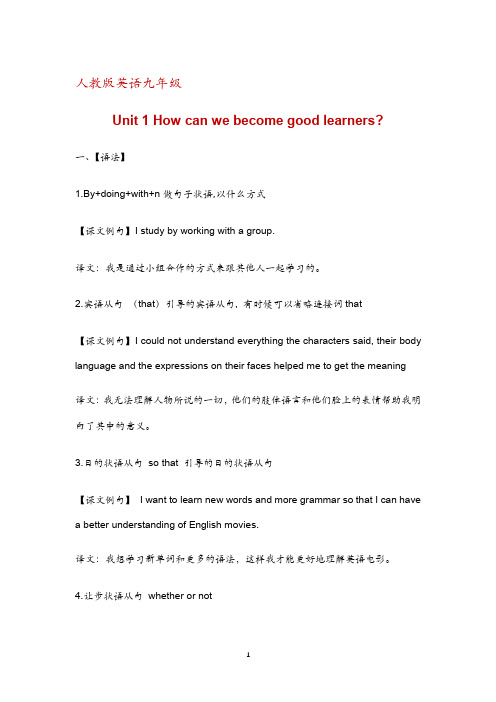
人教版英语九年级Unit 1 How can we become good learners?一、【语法】1.By+doing+with+n做句子状语,以什么方式【课文例句】I study by working with a group.译文:我是通过小组合作的方式来跟其他人一起学习的。
2.宾语从句(that)引导的宾语从句, 有时候可以省略连接词that【课文例句】I could not understand everything the characters said, their body language and the expressions on their faces helped me to get the meaning译文:我无法理解人物所说的一切,他们的肢体语言和他们脸上的表情帮助我明白了其中的意义。
3.目的状语从句so that 引导的目的状语从句【课文例句】I want to learn new words and more grammar so that I can have a better understanding of English movies.译文:我想学习新单词和更多的语法,这样我才能更好地理解英语电影。
4.让步状语从句whether or not【课文例句】Whether or not you can do this well depends on your learning habits.译文:你能否做好这件事取决于你的学习习惯。
定义从句that 引导的定语从句修饰everything【课文例句】Everything that you learn becomes a part of you and changes you.译文:你所学到的一切都成为你的一部分,改变你。
二、【重点句型】1.What/How about going shopping? 去购物怎么样?2.Why don't you go shopping? 你为什么不去购物呢?3.Why not go shopping? 为什么不去购物呢?4.Let's go shopping. 我们去购物吧。
初三英语上册(人教新目标)Unit1Howcanwebecomegoodlearners-知识点总结
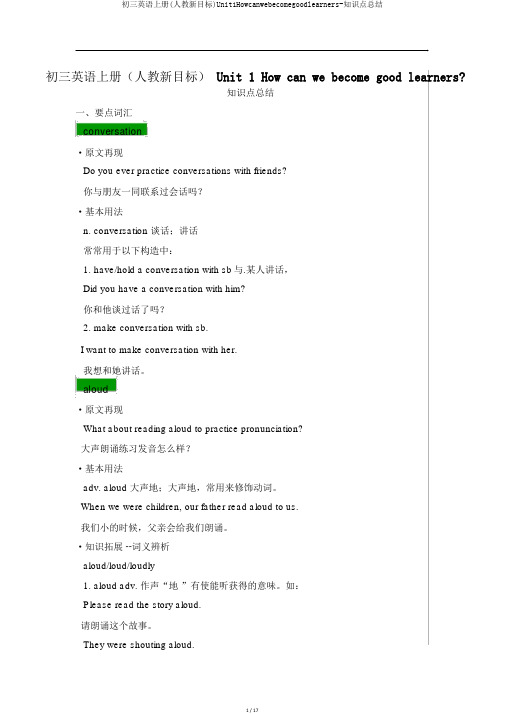
初三英语上册(人教新目标)Unit 1 How can we become good learners?知识点总结一、要点词汇conversation·原文再现Do you ever practice conversations with friends?你与朋友一同联系过会话吗?·基本用法n. conversation 谈话;讲话常常用于以下构造中:1. have/hold a conversation with sb与.某人讲话,Did you have a conversation with him?你和他谈过话了吗?2. make conversation with sb.I want to make conversation with her.我想和她讲话。
aloud·原文再现What about reading aloud to practice pronunciation?大声朗诵练习发音怎么样?·基本用法adv. aloud 大声地;大声地,常用来修饰动词。
When we were children, our father read aloud to us.我们小的时候,父亲会给我们朗诵。
·知识拓展 --词义辨析aloud/loud/loudly1.aloud adv. 作声“地”有使能听获得的意味。
如:Please read the story aloud.请朗诵这个故事。
They were shouting aloud.他们在大声地呼叫。
2.loud. adv. 大声“地,大声地,响亮地”,常指在谈笑等方面。
如:Don't talk so loud.不要这样大声地讲话。
Speak louder.说得大声点儿。
3.loudly adv. 大声“地”有时与 loud 通用,但含有喧杂的意味。
如:Someone knocked loudly at the door.有人大声叩门。
unit_1_how_can_we_become_good_learners_重点短语和句型总结
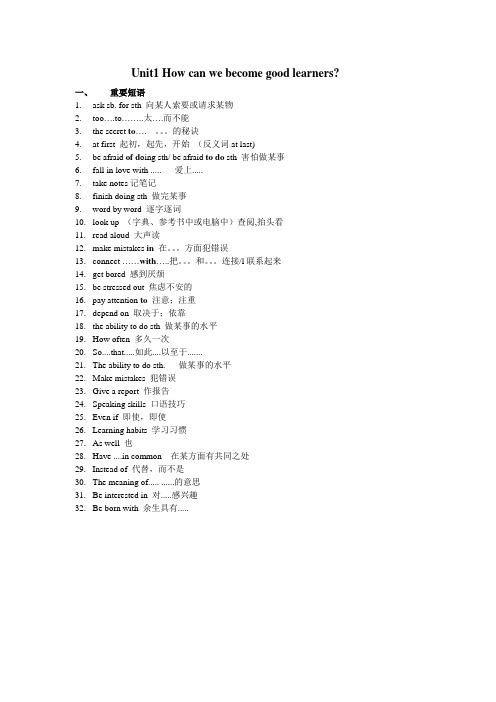
Unit1 How can we become good learners?一、重要短语1.ask sb. for sth 向某人索要或请求某物2.too….to……..太….而不能3.the secret to…. 。
的秘诀4.at first 起初,起先,开始(反义词at last)5.be afraid of d oing sth/ be afraid to do sth 害怕做某事6.fall in love with ..... 爱上.....7.take notes记笔记8.finish doing sth 做完某事9.word by word 逐字逐词10.look up (字典、参考书中或电脑中)查阅,抬头看11.read aloud 大声读12.make mistakes in 在。
方面犯错误13.connect ……with…..把。
和。
连接/l联系起来14.get bored 感到厌烦15.be stressed out 焦虑不安的16.pay attention to 注意;注重17.depend on 取决于;依靠18.the ability to do sth 做某事的水平19.How often 多久一次20.So....that.....如此....以至于.......21.The ability to do sth. 做某事的水平22.Make mistakes 犯错误23.Give a report 作报告24.Speaking skills 口语技巧25.Even if 即使,即使26.Learning habits 学习习惯27.As well 也28.Have ....in common 在某方面有共同之处29.Instead of 代替,而不是30.The meaning of..... ......的意思31.Be interested in 对.....感兴趣32.Be born with 余生具有.....重点句型1.The more you read, the faster you’ll be.The +比较级.......,the +比较级....... 越。
九年级英语全册Unit1Howcanwebecomegoodlearners知识点汇总(新)人教新目标版
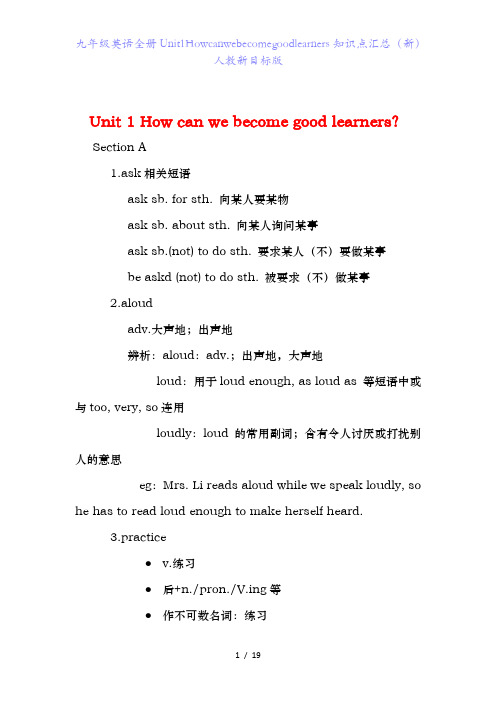
Unit 1 How can we become good learners?Section A1.ask相关短语ask sb. for sth. 向某人要某物ask sb. about sth. 向某人询问某事ask sb.(not) to do sth. 要求某人(不)要做某事be askd (not) to do sth. 被要求(不)做某事2.aloudadv.大声地;出声地辨析:aloud:adv.;出声地,大声地loud:用于loud enough, as loud as 等短语中或与too, very, so连用loudly:loud 的常用副词;含有令人讨厌或打扰别人的意思eg:Mrs. Li reads aloud while we speak loudly, so he has to read loud enough to make herself heard.3.practice●v.练习●后+n./pron./V.ing等●作不可数名词:练习eg:Students get lots of practice in the English club.4.patientadj.有耐心的n.病人patiently:adv. 修饰动词patience:n. 耐心短语:in patience 耐心地5.It takes sb. some time to do sth.某人花费时间做某事=Sb. spends some time doing sth.eg: It took me three years to finish the work. = I spent three years finishing the work.6.the +比较级(+主语+ 谓语),the +比较级(+ 主语+ 谓语):越……,越……eg:The more you eat, the heavier you will be.7.find it + adj.+ to do sth.发现做某事……eg: I find it very interesting to learn English.8.secret:n.秘密;秘诀eg:Neither of them knows the secret.adj.秘密的;保密的eg:We discovered a secret passage behind the wall.短语keep the secret =keep sth. to oneself 保守秘密the secret to/of ...:……的秘诀/ 秘密keep sth. secret对某事保密9.expression:n.表情;表示express:v.及物动词;表达;表露express...to sb.:向某人表达……eg: I find it difficult to express my meaning to the old Frenchman.10.辨析invent:发明(从无到有的东西)discover:发现(本来就已经存在,但不为人知的事物)find:找到或发现11.look up:查阅;抬头看宾语的位置:名词可前可后eg: Look up the word in the book, and you will know its meaning.look+pron.+ upeg: Please look them up in the dictionary carefully.look up to:仰慕eg: Many young people look up to Yao Ming astheir hero.look短语look down on sb. 小瞧某人look for 寻找look out 小心look around 环顾四周look over 仔细检查12.by后加名词、代词或动词ing形式by+地点名词表方位在……旁边eg:We live by the sea.by+时间名词到……时为止(已发生某事);最晚、不迟于……谓语可用完成时eg:I must be in bed by ten o’clock.by+交通工具、交通方式通过……,由……,乘……eg:by train / taxi / bike/ boat / sea / water 辨析by:乘某种交通工具I go to school by bike.in:后+某种材料、衣服、颜色或语言Now she begins to paint in oils.with:后+身体器官或某种工具He often writes with his left hand.表示具有,拥有,戴Who’s that man with sunglasses?Section B1.increasev.增加;增长短语increase to增加到……eg:The population in this city will increase to 1,000,000.increase by...增加了……eg:The price of the vegetables increased by 10%.increasen.增加;增大eg:The increase in population caused a shortage of food.2.speedn.速度短语at a/the speed of以……的速度at high/low/full speed以高速/ 低速/ 全速speed up加速3.make mistakes犯错误短语by mistake 由于差错,错误地mistake...for... 错把……当成……4.bornv.出生adj.天生的be born in+ 月份/年份/地点be born on+ 具体日期be born with+ 生来就有5.ability单数能力eg:We trust in China’s ability to be the strongest country in the world.复数才能eg:He is a man of many abilities.有能力做某事+不定式eg:He has the ability to speak English fluently.6.depend on依靠;取决于;随……而定eg:We shouldn’t depend on our parents too much.7.createv. 创造;创建creation n.创造,创造力creator n.创造者creative adj.有创造力的8.activeadj.活跃的;积极的作表语或定语take an active part in:积极参加eg:We all take an active part in the sports meeting.activityn.活动9.pay attention to注意;关心后+n./pron/V.ing/从句10.connectv.连接;与……有联系be connected to与……相连接=be joined to11.even if即使常引导让步状语从句12.knowledgen.知识;学问不可数a knowledge of/about...……方面的知识eg:He has a knowledge of painting.13.辨析remember to do记得去做事事情还没做eg:Remember to close the door before you leave the room.remember doing记得做过事事情已经做完eg:He remembers closing the door.14.instead of代替;作为……的替换eg: He will attend the meeting instead of me.+doing/n.=rather thaneg: Maybe I will become an actor instead of /rather than a singer in the future.=take one's place to do sth.eg: Mulan took her father's place to join the army.=Mulan joined the army instead of her father.Section A1.ask相关短语ask sb. for sth. 向某人要某物ask sb. about sth. 向某人询问某事ask sb.(not) to do sth. 要求某人(不)要做某事be askd (not) to do sth. 被要求(不)做某事2.aloudadv.大声地;出声地辨析aloudadv.出声地,大声地loud用于loud enough, as loud as 等短语中或与too, very, so连用loudlyloud 的常用副词含有令人讨厌或打扰别人的意思eg:Mrs. Li reads aloud while we speak loudly, so he has to read loud enough to make herself heard.practicev.练习后+n./pron./V.ing等作不可数名词练习eg:Students get lots of practice in the English club.3.patientadj.有耐心的n.病人patientlyadv. 修饰动词patiencen. 耐心短语in patience 耐心地4.It takes sb. some time to do sth.某人花费时间做某事=Sb. spends some time doing sth.eg: It took me three years to finish the work.= I spent three years finishing the work.5.the +比较级(+主语+ 谓语),the +比较级(+ 主语+ 谓语)越……,越……eg:The more you eat, the heavier you will be.6.find it + adj.+ to do sth.发现做某事……eg: I find it very interesting to learn English.7.secretn.秘密;秘诀eg:Neither of them knows the secret.adj.秘密的;保密的eg:We discovered a secret passage behind the wall.短语keep the secret =keep sth. to oneself 保守秘密the secret to/of ...……的秘诀/ 秘密keep sth. secret对某事保密8.expressionn.表情;表示expressv.及物动词表达;表露express...to sb.向某人表达……eg: I find it difficult to express my meaning to the old Frenchman.9.辨析invent发明(从无到有的东西)discover发现(本来就已经存在,但不为人知的事物)find找到或发现10.look up查阅;抬头看宾语的位置名词可前可后eg: Look up the word in the book, and you will know its meaning.look+pron.+ upeg: Please look them up in the dictionary carefully.look up to仰慕eg: Many young people look up to Yao Ming as their hero.look短语look down on sb. 小瞧某人look for 寻找look out 小心look around 环顾四周look over 仔细检查11.by后加名词、代词或动词ing形式by+地点名词表方位在……旁边eg:We live by the sea.by+时间名词到……时为止(已发生某事);最晚、不迟于……谓语可用完成时eg:I must be in bed by ten o’clock.by+交通工具、交通方式通过……,由……,乘……eg:by train / taxi / bike/ boat / sea / water 辨析by乘某种交通工具I go to school by bike.in后+某种材料、衣服、颜色或语言Now she begins to paint in oils.with后+身体器官或某种工具He often writes with his left hand.表示具有,拥有,戴Who’s that man with sunglasses?Section B1.increasev.增加;增长短语increase to增加到……eg:The population in this city will increase to 1,000,000.increase by...增加了……eg:The price of the vegetables increased by 10%.increasen.增加;增大eg:The increase in population caused a shortage of food.2.speedn.速度短语at a/the speed of以……的速度at high/low/full speed以高速/ 低速/ 全速speed up加速3.make mistakes犯错误短语by mistake 由于差错,错误地mistake...for... 错把……当成……4.bornv.出生adj.天生的be born in+ 月份/年份/地点be born on+ 具体日期be born with+ 生来就有5.ability单数能力eg:We trust in China’s ability to be the strongest country in the world.复数才能eg:He is a man of many abilities.有能力做某事+不定式eg:He has the ability to speak English fluently.6.depend on依靠;取决于;随……而定eg:We shouldn’t depend on our parents too much.7.createv. 创造;创建creation n.创造,创造力creator n.创造者creative adj.有创造力的8.activeadj.活跃的;积极的作表语或定语take an active part in:积极参加eg:We all take an active part in the sports meeting.activityn.活动9.pay attention to注意;关心后+n./pron/V.ing/从句10.connectv.连接;与……有联系be connected to与……相连接=be joined to11.even if即使常引导让步状语从句12.knowledgen.知识;学问不可数a knowledge of/about...……方面的知识eg:He has a knowledge of painting.13.辨析remember to do记得去做事事情还没做eg:Remember to close the door before you leave the room.remember doing记得做过事事情已经做完eg:He remembers closing the door.14.instead of代替;作为……的替换eg: He will attend the meeting instead of me.+doing/n.=rather thaneg: Maybe I will become an actor instead of /rather than a singer in the future.=take one's place to do sth.eg: Mulan took her father's place to join the army. =Mulan joined the army instead of her father.。
How-can-we-become-good-learners重点短语知识点讲解
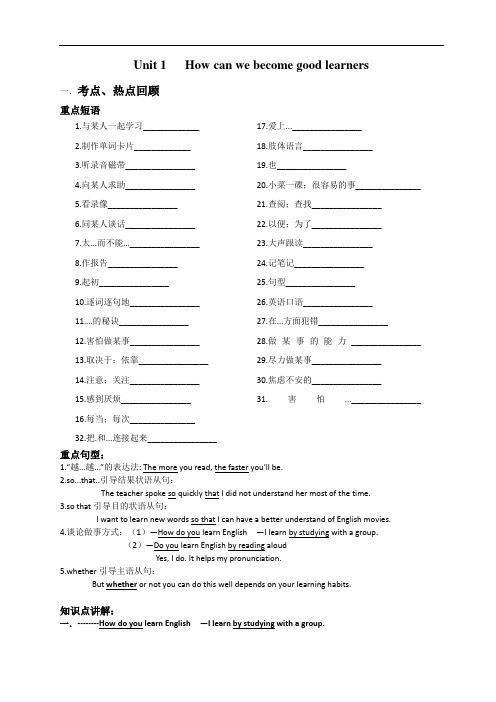
Unit 1 How can we become good learners一.考点、热点回顾重点短语1.与某人一起学习_____________2.制作单词卡片_____________3.听录音磁带________________4.向某人求助________________5.看录像________________6.同某人谈话________________7.太...而不能...________________8.作报告________________9.起初________________10.逐词逐句地________________11....的秘诀________________12.害怕做某事________________17.爱上...________________18.肢体语言________________19.也________________20.小菜一碟;很容易的事_______________21.查阅;查找________________22.以便;为了________________23.大声跟读________________24.记笔记________________25.句型________________26.英语口语________________27.在...方面犯错________________28.做某事的能力________________13.取决于;依靠________________14.注意;关注________________15.感到厌烦________________29.尽力做某事________________30.焦虑不安的________________31.害怕...________________16.每当;每次_______________32.把.和...连接起来________________重点句型:1.“越...越...”的表达法: The more you read, the faster you’ll be.2.so...that..引导结果状语从句:The teacher spoke so quickly that I did not understand her most of the time.3.so that引导目的状语从句:I want to learn new words so that I can have a better understand of English movies.4.谈论做事方式:(1)—How do you learn English —I learn by studying with a group.(2)—Do you learn English by reading aloudYes, I do. It helps my pronunciation.5.whether引导主语从句:But whether or not you can do this well depends on your learning habits.知识点讲解:一.--------How do you learn English —I learn by studying with a group.1)by+交通工具,“乘/坐...” by bus2)by+地点,“在...的旁边;靠近...” by the lake3)by+时间,“截止到...;不迟于...” by ten【by短语】by the way 顺便问一下by accident= by chance 偶然地by mistake 错误地one by one 一个接一个step by step 一步一步地little by little 逐渐地by the time 到……为止by oneself 独自地by and by 不久之后by hand 用手by the end of 到….... 末尾He broke the window with a stone.Please answer the question in English.练习:do you learn English words -_____making word cards.A. ToB. ByC. ForD. With2.-How do you get to school every day. Lucy -I go to school _____.my bike my bike bus a bus3.made a living by____(sell) old things.4.She learns English by listening to tapes.(对划线部分提问)_____ ______ she learn English5.Most of them take the train to work.(改为同义句)Most of them go to work ______ ______.二..疑问词how的用法1)(问方式方法)怎样;如何①---_______ do you learn English well---I learn it by using it in my daily life.②---Can you tell me_______I can get to the nearst post office2) 身体怎么样--How are you ---Fine. Thanks.3) How +adj 构成的疑问词How often______ How old_____ How far____ How soon______How many_______ How much______ How long_____ How tall______练习: 用How +adj 构成的疑问词填空will it take you from your school to the library---About half an hour.2. ---________is Mr Wang ---He is forty years old._______ will you come back ---In a week._______people are there in your family ---Four.________milk do we need ---Three bottles._________do you go to see your grandma ---Once a week.do you live from school ---Three miles.三.Do you have conversations with friends in Englishconversion“交谈;谈话”:have/hold a conversion with...“与...交谈/谈话”make conversion“闲谈;搭讪” be in a conversion with...“与...在谈话”Eg. He had a conversation with his son yesterday.四.by asking the teacher for helpsb for sth向某人要某物Eg:ask sb. for help ask our teacher for advicesb. to do sth. 要求某人做某事ask sb. not to do sth. 要求某人不要做某事练习:1).[2013·北京] Our teacher often asks us________ questions in groups.A.discuss B.to discuss C.discussing D.discussed2). If you have difficulty in learning English, you should ask your teacher ___ help.A. forB. ofC. inD. on3).( ) The young should ___ the old ___ advice at work.A. ask; forB. ask; toC. ask for; /D. asks; /五.watch/read/see/look at “看” 法不同(1)看电视、看比赛、看表演用watch; watch TV 看电视(2)看书、看报、看杂志用read read the book看书(3)看电影、看医生用see see the doctor 看医生(4) 看黑板、看地图用look at look at the blackboard 看黑板练习:picture. Can you see the man in the picture He isn’t ________ the book. He is ______TV.2.( ) ____ the board , child! Read the words on it after me.A. LookB. Look atC. SeeD. Watch六. What about reading aloud to practice pronunciation1.用于提建议的句型有:(1)What about doing sth =How about doing sth ….怎么样(2)Why don’t you do sth= Why not do sth 为什么不呢(3)Let’s do sth.让我们一起做某事吧。
九年级Unit 1 How can we become good learners重点解析

人教版英语九年级单元重点知识Unit 1 How can we become good learners?.基础夯实【重点单词短语过关】读一读背一背note n.笔记;记录 v.注意;指出pal n.朋友;伙伴pattern n.模式;方式physics n.物理;物理学chemistry n.化学partner n.搭档;同伴pronounce v.发音increase v.增加;增长speed n.速度 v.加速ability n.能力;才能textbook n.教科书;课本conversation n.交谈;谈话aloud adv.大声地;出声地pronunciation n. 发音;读音sentence n.句子patient adj.有耐心的 n.病人expression n.表达方式;表示discover v.发现;发觉secret n.秘密;adj. 秘密的fall in love with 爱上;与...相爱基础夯实【重点单词短语过关】读一读背一背attention n.注意;关注pay attention to 注意;关注connect v.(使)连接;与...有联系connect…with... 把...和...连接或联系起来overnight adv.一夜之间;在夜间review v.& n.回顾;复习knowledge n.知识;学问wisely adv.明智地;聪明地grammar n.语法repeat v.重复;重做study for a test 备考have conversations wit与…交谈speaking skills 口语技巧a little 有点儿at first 起初起先because of 因为as well 也brain n.大脑active adj.活跃的;积极的look up 查阅;抬头看基础夯实【重点单词短语过关】读一读背一背make mistakes 犯错误talk to 交谈depend on 依靠依赖in common 共有的for example 例如think about 考虑even if 即使尽管纵容look for 寻找worry about 担心担忧learning habits 学习习惯make word cards 制作单词卡片ask the teacher for help 向老师求助spoken English 英语口语word by word 一字一字地take notes 记笔记how often 多久一次a lot of 许多the ability to do sth. 做某事的能力be interested in 对……感兴趣get bored 感到无聊基础夯实【单元目标语句回顾】读一读练一练--How do you study for a test?--I study by working with a group.--What about reading aloud to practice pronunciation? --It's too hard to understand spoken English.--Have you ever studied with a group?--Yes,I have.I've learned a lot that way-- How can I read faster?--You can read faster by reading word groups.--One way is by listening to tapes.单词和短语精讲1. little用法little用作形容词时有两种用法:①修饰人、事或物,表示“小的,幼小的,矮小的”,②表示数量“很少,几乎没有”,本身就含有否定意思。
Unit 1 How can we become good learners 重点速记语法精讲写作

Unit 1 How can we become good learners?我们如何成为好的学习桌?重点速记词汇梳理1 pronounce(v.发音)-pronunciation(n.发音;读音)2 patient(adj.有耐心的) patiently(adv.耐心地) patience(n.耐心) impatient(adj.没有耐心的)3 express(v.表达)-expression(n.表情;表达方式)4 discover(v.发现;发觉)-discovery(n.发现)-discoverer(n.发现者)5 create(v.创造;创建) creative(adj.有创造力的) creation(n.创造;创作) creator(n.创造者;创作者) creativity(n.创造力)6 connect[v.(使)连接;与······有联系]-connection(n.连接;联系)7 active(adj.活跃的;积极的)-actively(adv.活跃地;积极地)-activity(n..活动;活跃)8 wise(adj.充满智慧的;明智的)-wisely(adv.明智地;聪明地)-wisdom(n.智慧;才智)9 physics(n.物理)-physical(adj.物理学的;身体的)-physicist(n.物理学家)10 chemistry(n.化学)-chemical(adj.化学的n.化学品)-chemist(n.化学家;药剂师)11 memory(n.记忆;回忆)-memorize(v.记忆;记住)词块归纳1 ask(sb.)for help(向某人)求助ask sb. to do sth.要求某人做某事2 study for a test 备考3 listen to tapes 听磁带4 watch videos 看录像5 have a conversation with.,.与······交谈6 a slow reader 读书慢的人7 increase my reading speed 提高我的阅读速度8 make word cards 制作单词卡片9 read aloud 朗读10 give a report 作报告11 the secret to...······的秘诀12 word by word 逐字地,一字一字地bit by bit一点一点地13 take notes 记笔记14 fall in love with 爱上······15 look up(在词典、参考书中或通过电脑)查阅;抬头看16 make mistakes/a mistake 犯错;出错by mistake 错误地;无意中mistake,,. f or...把······错当成······17 be born with 天生具有18 depend on 依靠;取决于19 have.,. in common在······方面有共同之处20 be interested in 对······感兴趣21 pay attention to 注意;关注22 learn from 从······中学习23 write down写下;记录下24 look for 寻找25 on one's own 独立地;独自地,单独地26 instead of代替;而不是27 find out 找出;查明28 over and over again 多次;一再;反复地29 a little=a bit少许,一点30 at first 起初31 as well也;还32 connect.., with把······和······连接或联系起来33 keep a diary 记日记34 the ability to do sth.做某事的能力35 whether or not是否36 think about 思考;考虑think of 想起;考虑think over 仔细考虑37 be good at=do well in 擅长于38 worry about 担心39 even=even though 即使;纵然;虽然40 the meaning of······的意思用法总结1 practice doing sth.练习做某事keep doing sth.继续做某事,一直做某事finish doing sth.做完某事2 by doing sth.通过做某事3 What about doing sth.?做某事怎么样?4 the+比较级,the+比较级越······,越······5 find it +adj. +to do sth.发现做某事······6 need to do sth.需要做某事7 remember to do sth.记得要做某事remember do in sth.记得做过某事8 be afraid of doing sth.害怕会发生某事be afraid to do sth.不敢做某事9 try to do sth.尽力做某事try doing sth.尝试做某事10 It's +adj. +to do sth.做某事是······的.11 help sb.(to)do sth.帮助某人做某事12 get+宾语+adj./adv./介词短语让·······处于······状态语法精讲"by+动词-ing 形式"表方式、方法语法示例1.My pronunciation improved as well by listening to the conversations in English movies.通过听英文电影中的对话,我的发音也得到了改善.(教材P33a)2.You can read faster by reading word groups.你可以通过读意群来读得更快.(教材P4 Grammar Focus)语法概述"by+动词-ing形式"常常表示方式或方法,在句中作状语,可以用来回答how引导的特殊疑问句.考向"by+动词-ing形式”表方式、方法①在此结构中,by是介词,意为"通过,使用"."by+动词-ing形式"表示方式或方法.»I can find the meaning of the new words by looking them up in a dictionary.我能通过查词典找到生词的意思.②"by+动词-ing形式"常用来回答how引导的问句.»-How will you catch up with others in your class?你将如何赶上班里的其他学生?-By studying harder.通过更加努力地学习.辨by, in与with拓介词by的其他常见用法:by+地点靠近;在······旁边Tom sits by the window in the classroom.汤姆坐在教室里靠窗的位置.by+时间不迟于,在······之前Mom told him to come back home by 10:00.妈妈让他十点之前回到家.by+交通工具乘······(表示方式)by train/boat/bus乘火车/船/公共汽车by+人由······所作The music by Mozart is famous all over the world.莫扎特创作的音乐举世闻名.典例(2022·抚顺中考)Amy wants to be a good learner________ practicing more.A. byB. forC. onD. with解析:句意:埃米想要通过多加练习成为一个好的学习者.by"通过";for"为了";on"关于";with"使用".by doing sth.表示"通过做某事",符合语境.故选A.写作指导话题分析本单元的话题是“学会如何学习”,所涉及的写作内容通常为以下两方面:(1)介绍学习方法;(2)针对他人在学习中遇到的困难给出学习建议.写作时可参考本单元所提到的学习方法.写作实践(2022·北部湾经济区中考)在丰富多彩的初中学习生活中,你一定积累了很多学习方法和经验吧!现校刊英文专栏以"Learning to learn"为主题征稿.请你根据以下提示,用英语写一篇短文投稿.写作要点:1.一个科目名称;2.此科目的学习方法(至少两个);3.此科目的学习感受或期望.写作要求:1.将标题和首句补充完整;2.包含所有要点,可适当增加细节,以使行文连贯;3.文中不得透露个人信息;4.词数80左右.Methods of learning________Here are my methods of learning______________________________________________________________ ____________________________________________________________________________________________ ____________________________________________________________________________________________ ____________________________________________________________________________________________ ____________________________________________________________________________________________ ____________________________________________________________________________________________ ____________________________________________________________________________________________ ____________________________________________________________________________________________ ____________________________________________________________________________________________思路导引开篇点题Here are my methods of learning English.陈述方法First,...watch English movies and listen to English songs.Second, reading passages on the same topic...What's more, it's a good habit to keep a diary in English.表达期望English is a bridge which connects the world with us.I hope I can make greater progress in the future.词句积累佳作展示Methods of learning EnglishHere are my methods of learning English.①First, I usually watch English movies and listen to English songs. ②I think they are relaxing ways to learn the correct pronunciation and proper expressions. ①Second, ③reading passages on the same topic helps a lot in learning new words. In this way, the new words can be repeated and I can understand their meanings better.①What's more,④it's a good habit to keep a diary in English. That helps me think in English and improve my writing skills as well.⑤English is a bridge which connects the world with us. It's interesting to learn it. I hope I can make greater progress in the future.名师点评本文要求介绍自己学习某一学科的方法,层次清晰、结构合理,语言生动.①运用First、Second、What's more 等衔接词使文章条理清晰;②运用宾语从句和ways to do sth.结构表达了个人感受;③运用动词-ing短语作主语,介绍了第二种学习方法;④运用"it's +n. +to do sth."结构介绍了第三种学习方法;⑤句含有定语从句,陈述英语的重要地位,引出后文的期待.阅读提升方法概述完形填空的考查目的并不是单纯地考查语法,大部分题目都是为了考查考生综合运用语言的能力而设置的.因此,要想选出既符合语法规则又能使上下文意思连贯的答案,除了要掌握必备的词汇和语法知识外,还应具备把握全文和根据上下文进行综合分析的能力.许多完形填空题的解题信息会在上下文中出现,因此我们在遇到无法确定答案的题目时,可回顾上文、兼顾下文,在文中寻找相关的线索或提示,从而确定答案,这种方法叫"瞻前顾后法".中考链接(2022·天津中考节选)When my sister Gina was born, she had a problem with her heart. She was weak after a long 36 and had to go to the hospital very often. She had 37 walking, playing with other children, and going to school.36.A. health B. illness C. peace D. letter37.A. trouble B. success C. trust D. tradition36.B方法指导根据上文中的"When my sister Gina was born, she had a problem with her heart"可知,吉娜天生心脏有问题,故此处用illness,表示她久病后身体虚弱,不得不经常去医院.选B.37.A 方法指导根据上文得知,吉娜天生心脏有问题,并且身体虚弱,得经常去医院,由此推知,她走路、和其他孩子玩耍以及上学都有困难.have trouble doing sth."做某事有困难".故选A.。
How can we become good learners重要知识点

How can we become good learners重要知识点一、by+doing在句中作方式状语,表示“通过某种方法、途径”,常用 how 提问。
-How do you study for a test? --你是怎样学习备考的?-I study by working with a group. --我通过小组合作学习。
拓展一:by的其他用法小结1.by+地点名词,表示方位,意为“在……旁边;靠近”。
My grandparents live by the sea.我的爷爷奶奶住在海边。
2.by+交通工具、交通方式名词(名词前不加冠词,且名词不用复数形式),意为“通过……,由……,乘……”。
如:by train/rail/taxi/bus/truck/bike/ boat/plane/land/sea/air等。
3.by+时间名词,意为“到……时为止;在……之前;不迟于……”。
He got there by four o'clock.他在4点前到了那里。
4.by+反身代词,意为“独自”。
Tina couldn't move the heavy box by herself蒂娜自己搬不动这么重的箱子。
5.by+动作执行者,用于被动语态,意为“被;由”。
The house was destroyed by fire.6.用于某些固定短语中word by word逐词 bit by bit一点一点;慢慢地 by the way顺便问一下by mistake 错误地 by accident 偶然;意外地 by hand 用手;手工拓展二:辨析 by,in 与 withby,in和with 都可以表示方式,但用法不同。
1.by强调“方式、方法、手段”,后接表示动作、行为的名词。
You may send the book by post.你可以通过邮局把书寄出去。
2.in 强调“用某种语言、工具、材料”等。
unit1howcanwebecomegoodlearners知识点整理

Unit 1 How can we become good learners语法一.介词by的用法意为“通过”,其后常接名词或动词-ing形式。
用来表示“以、通过、用(某种方法或手段)”而达到某种预期的目的,常用来回答how引导的特殊疑问句。
by doing sth意为“通过做某事”—How does the boy improve his spoken English—By talking with a foreigner.(1)—How do you learn English so well— chatting with my uncle in America online.A. ByB. WithC. In(2)Jackson studied Chinese by __________ tapes.A. listeningB. to listenC. listening toD. to listening to +时间,意为“不迟于,在……之前”I have to go to bed by ten o’clock. +地点,意为“在……旁”Jim sat down by the window.+交通工具,意为“乘……”I go to school by bike.5.由by构成的固定短语:by the way顺便说一下 by oneself独自=alone二.现在完成时的用法(一)用法:1.表示过去发生的某一动作或状态对现在造成的影响或结果.常用的标志词有already(“已经”,用于肯定句),yet(“还,已经”,用于否定句和疑问句),ever (“曾经”),never(“绝不,从不”),just(“刚刚”),before(“以前”),once (“一次”),twice(“两次”).I have already eaten the dinner.(说明我现在饱了)。
I have already seen the film.(1)You don’t need to describe her. I ______ her several times.A. meetB. will meetC. have met(2)—Hi, are you heading(向……行进) now— all our money,so we have to walk home now.A. spend C. have spent spending(3)Have you ever seen him ________A. agoB. two days agoC. beforeD. just now2.表示过去发生的某一动作或状态,一直持续到现在。
人教版九年级《Unit1 How can we become good learners》 重点单词、短语和句型全汇总

人教版九年级《Unit1 How can we become good learners?》重点单词、短语和句型全汇总Unit1 How can we become good learners?【重点短语】1. have conversation with sb. 同某人谈话2. too…to… 太……而不能3. the secret to… ……的秘诀4. be afraid of doing sth./ be afraid to do sth. 害怕做某事5. look up 查阅6. repeat out loud 大声跟读7. make mistakes in 在……方面犯错误8. connect ……with… 把……和……连接/联系起来9. get bored 感到厌烦10. be stressed out 焦虑不安的11. pay attention to 注意;关注12. depend on 取决于;依靠13. the ability to do sth.. 做某事的能力【考点详解】1. by + doing 通过……方式(by是介词,后面要跟动名词,也就是动词的ing形式)2. talk about 谈论,议论,讨论The students often talk about movie after class. 学生们常常在课后讨论电影。
talk to sb= talk with sb 与某人说话3. 提建议的句子:①What/ how about +doing sth.? 做…怎么样?(about后面要用动词的ing形式,这一点考试考的比较多)如:What/ How about going shopping?②Why don't you + do sth.? 你为什么不做…?如:Why don't you go shopping?③Why not + do sth. ? 为什么不做…?如:Why not go shopping?④Let's + do sth. 让我们做…...吧。
- 1、下载文档前请自行甄别文档内容的完整性,平台不提供额外的编辑、内容补充、找答案等附加服务。
- 2、"仅部分预览"的文档,不可在线预览部分如存在完整性等问题,可反馈申请退款(可完整预览的文档不适用该条件!)。
- 3、如文档侵犯您的权益,请联系客服反馈,我们会尽快为您处理(人工客服工作时间:9:00-18:30)。
Unit 1 How can we become good learners? 一.考点、热点回顾重点短语1.与某人一起学习_____________2.制作单词卡片_____________3.听录音磁带________________4.向某人求助________________5.看录像________________6.同某人谈话________________7.太...而不能...______________ __8.作报告________________ 9.起初________________ 10.逐词逐句地________________ 11....的秘诀________________ 12.害怕做某事________________ 17.爱上...______________ __18.肢体语言________________ 19.也________________ 20.小菜一碟;很容易的事_______________ 21.查阅;查找________________ 22.以便;为了________________ 23.大声跟读________________ 24.记笔记________________ 25.句型________________ 26.英语口语________________ 27.在...方面犯错________________ 28.做某事的能力________________13.取决于;依靠________________ 14.注意;关注________________ 15.感到厌烦________________ 29.尽力做某事________________ 30.焦虑不安的________________ 31.害怕...______________ __16.每当;每次_______________32.把.和...连接起来________________1.用于提建议的句型有:(1)What about doing sth ?=How about doingsth? ….怎么样?(2)Why don’t you do sth?= Why not do sth? 为什么不呢?(3)Let’s do sth.让我们一起做某事吧。
(4)Shall we/I do sth?我们做…好吗?(5)had better do/not d o sth 最好做/不做某事(6) Will/Would you please do sth 请你做…好吗?(7) Would you like t o do sth? 你想去做某事吗?(8)Would you mind doing sth?你介意做某事吗?make a decision make progress make a wish练习:他在考试中犯了许多错。
He ________ ________ ____________ in the exam.十六:.depend on取决于;依靠;依赖练习:—Can you go for a picnic as planned? —It ____________ (决定于) the weather.十七.I did not understand these sentences at first.(1) at first = at the beginning 最初,开始【强调在时间顺序或做某事过程等开始之初】(2) first of all 首先,第一【表明陈述事情的重要性】练习:( ) 1.When you want to work for our country in the future, ____, we should have strong body and rich knowledge.A. at firstB. first of allC. for the first timeD. after all( )2.We can do a lot to stay healthy. ____ , we should eat a balanced diet.A. At a timeB. In factC. First of allD. All together十八..pay attention to关注;注意You must pay attention to listening to your teacher in class.[探究] pay attention to表示―关注;注意‖,其后若跟动词,要用__________形式。
练习:根据句意及首字母提示补全单词:You'd betterpay more a___________to the way you speak when having a discussion.十九.I don't know how to increase my reading speed.how to increase my reading speed属于―特殊疑问词+________________‖的复合结构,在句中作动词know的____语。
[拓展] ―特殊疑问词+动词不定式‖的复合结构作宾语时,可以转化为宾语从句。
Could you please tell me how to get there? =Could you please tell me how I can get there?练习:改为同义句1).We want to know how we can study well. = We want to know ______ ____ study well.2).I don’t know what I can do next.=I don’t know _____ ______ _____next.二十.They also look for ways to review what they have learned.look for ―寻找‖,强调寻找的动作和过程,有目的地找。
练习:I’m_______my peneverywherfind ―找到;发现‖,找到或发现具体的动词,或偶然发现某物,强调结果。
e, but Ican’t_____it.Read the passage,and_____theanswer tothisquestion.find out―弄清;查明‖,经过困难、曲折调查、询问或研究等之后弄清楚,明白。
二十一.I discovered that listening to somethingyou are interested in is the secret to languagelearning.1.【解析】listen v 听 →listener n 收听者 listen to 听…… ①My father is a good ________(listen). ②Tom is a good _______(listen) ,many students like to make friends with him. 注:动词+er =名词 teach — teacher work — worker clean — cleaner farm —farmer play —player sing — singer wait — waiter own — owner2.【拓展】listen to/hear (1)listen/listen to 听,侧重听的―过程― (2)hear 听,侧重听的―结果‖( )He _____but could _____ nothing.A .heard ; listened B. listened; heardC. heard; heard3.hear sb. do sth 听见某人做某事I often hear him sing in the room.hear sb. doing sth 听见某人正在做某事I hear him singing in the room( ) When the little boy _____ someone coming upstairs, he stopped _____.A. heard; to cry B .listened; crying C. heard; crying D .listened; to cry中考链接:1---How do you study Chinese so well?---________reading plenty of booksA. ToB. OfC. AtD. By2. My grandfather has a computer , but he doesn’t know ______ to use it.A. whatB. howC. whoD.which3. --What’s your problem? --I havetrouble_____these words in English.A. talkingB. sayingC. tellingD. speaking4. Did you find ____very interesting to playyo-yo? A. this B. it’s C. that D. it5.--I have no idea if he______. --He will go to the cinema if I _______.A. come; won’t rainB. comes; doesn’t rainC. will come; doesn’t rainD. comes; aren’t raining6._____ exercise you take, _____ you’ll be.A. The fewer, the fatterB. The less, the fatterC. The less, the more fatter7.Why______ the language club?A. not joinB. don’t joinC. not joiningD. aren’t you join8.It was ______ lovely weather ______ wedecided to spend the day on the beach.A. such a;thatB. such;thatC. such;asD. so;that9.You don’t have to _______ every new word in the dictionary while reading.A. look forB. look upC. look atD. look after10.The heavy snow didn’t__________to the airlines.A. pay attention toB.add toC.make a difference toD.keep to11. Many children are left alone in the countryside. Let’s try our best_______them.A.helpB. helpingC.to helpD.helps12._______careful you are,________mistakes you’ll make.A.The more, the lessB.The fewer, the moreC.The less, the lessD.The more, the fewer13.I find _______easy to learn English well.A.thisB.itC.thatD.they14.--I don’t know_________. –Because he has to look after his mother.A.why he is leavingB.why is he leavingC.whether he is leavingD. whether is he leaving15.The dishes my mothercooks_________delicious. A.taste B.look C.sound D.feel课堂练习:I. 词形填空1. Most of us learn English by _________(study) our textbooks.2. Reading aloud can improve our ___________(speak) skills.3. Hearing they will see a moving, the students all got ________ (excite).4. Don’t speak too ________(quick), we can’t catch you.5. Can you think of the best way ________( solve ) this problem?6. If you keep________(practice) running every day, you will be a good player.II. 单项选择1.Nobody can learn English well_____you work hard on it.A. ifB. unlessC. whenD. but2.I can’t understand_________English.A. speakB. speakingC. spokenD. spoke3.---Would you please tell me_______to chat with pen pals?---Of course . It's very easy.A. how to use QQB. what to use QQC. why to use QQD. when to use QQ4.If you don't know the words,__________in the dictionary .A. look them upB. Look up them B. look at them D. look them at5.---Will you go to Mathew's birthday party this Saturday? ----No,_______I am invited.A.whenB. UnlessC. untilD. if6. ---I find______interesting to fish in the river.---So do I.A.thatB.itC.oneD.you7. My sister has a lot of trouble ______ math.A.to learn B.learning C.learned D.learns8.—Why not John a toy car for his birthday?— Good idea! He is crazy about cars.A.buyB. buyingC. to buyD. buys9.Finish your homework, then you’ll_______watch TV for an hour.A.canB. be able toC.ableD.could10.This movie wasn’t________. He fell asleep half way through it.A.interesting enoughB. enough interestingC.interested enoughD. enough interested11.The rivers will become dirtier and dirtier_________we take action to protect them.A.sinceB.ifC.untilD.unless12.We have two dogs. One is white,_________is black.A.otherB.anotherC.the otherD.others13.—Could you give me some_______on how to learn English_______? –Sure. Practice makes perfect.A.advice, goodB.suggestions goodC.advice, wellD.suggestion, well14.The boys _____ up conversations in English.A. enjoy makesB. enjoy to makeC. enjoy makingD. enjoyed make15.________ it is blowing! I can hardly walk on.A. What strongB. How strongC. How stronglyD. What strongly wind 16. Many students usually make mistakes______ grammar.A. withB. toC. inD. of 17.I really enjoyed your speech, ______ therewere some parts I didn’t quite understand.A. becauseB. forC. untilD. though18. —Thanks for listening to my problem andgiving me your advise, Amy. —.That’s what friends are for.A. My pleasureB. With pleasureC. Never mindD. It’s nice of youIII.句型转换1.L orna made great progress in math by gettinga tutor. (对划线部分提问)______ _____ Lorna make great progress in math?2.T om seemed to be right. _____ ______ that Tom was right.(改同义句)3.M y friend studies English by listening to tapes.(对划线部分提问)________ _______ your friend __________English?4.I make word cards. I learn English words.(合并成一句)I learn English words __________________cards.5.S he finds that it isn’t easy to learn English.(改为同义句)6.S he finds _______ hard________ _______ English.7.I have ever studied with agroup.(一般疑问句) ________ _________ever________with a group?8.The math problem is difficult. I can’t work it out.(改为同义句)The math problem is________difficult________ I can’t work it out.= The math problem is________difficult________me________work out.。
